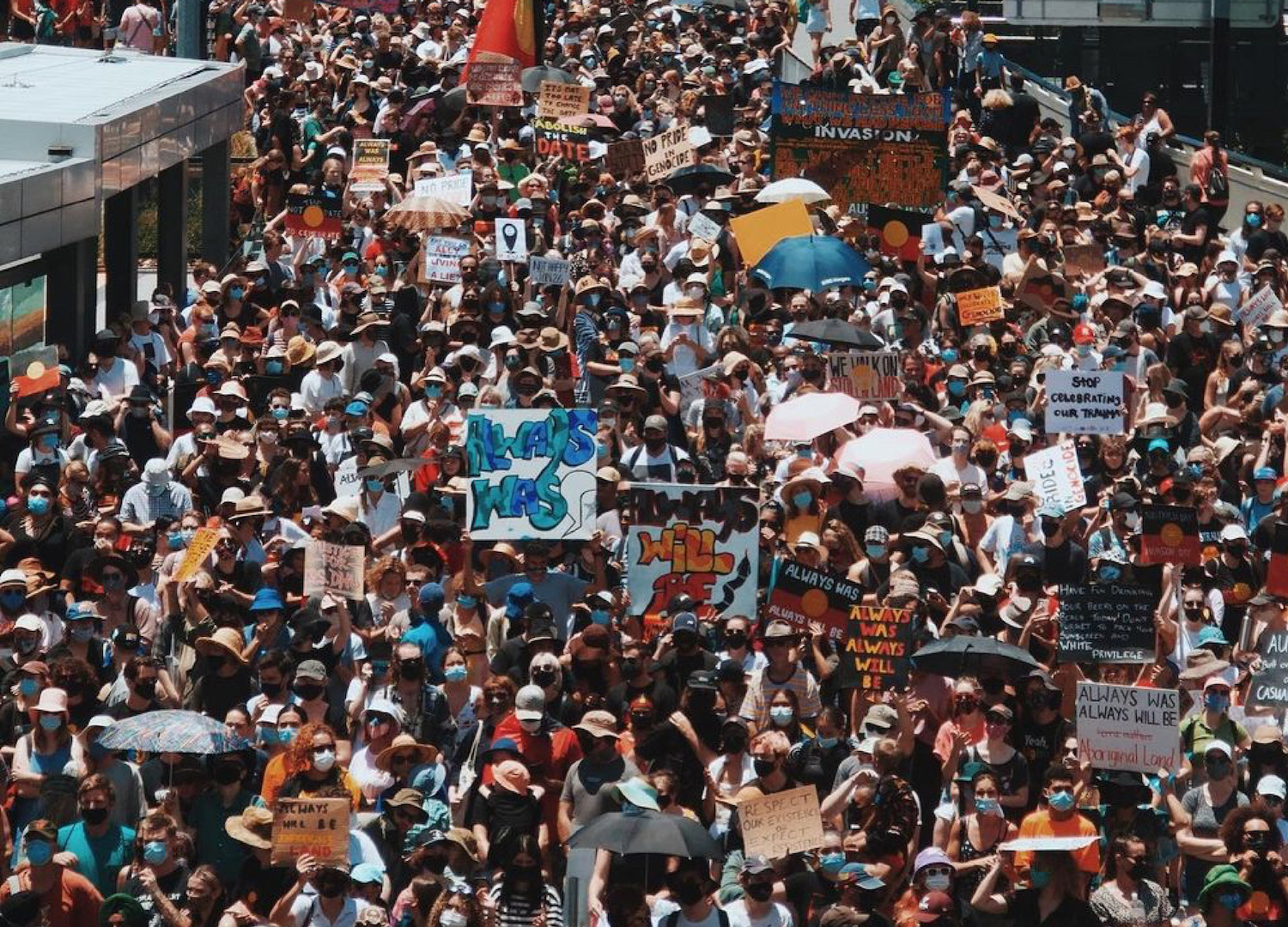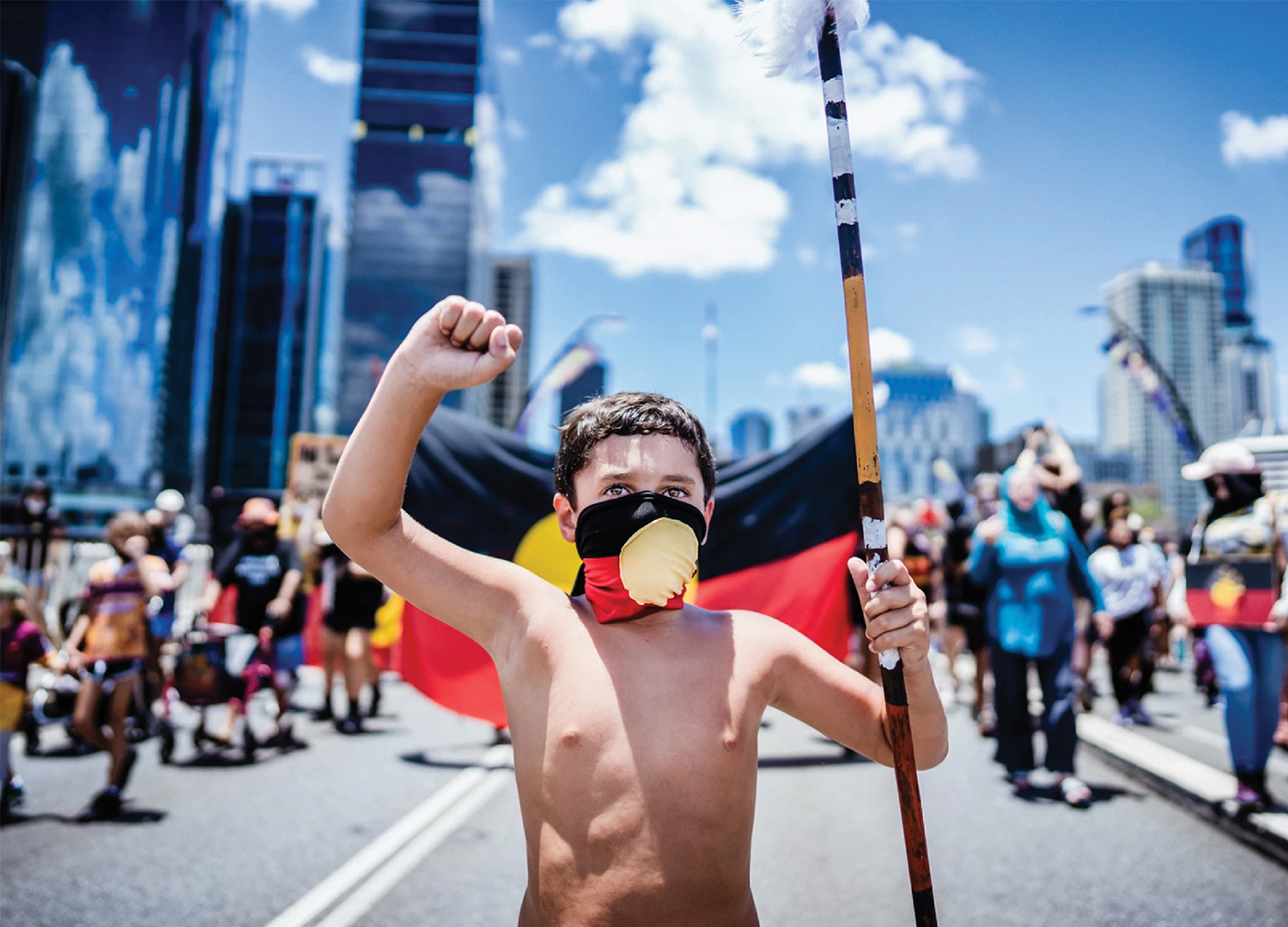
Get Up, Stand Up, Show Up: Why 26 January Can Never Represent a Day of Unity
words NICK HARVEY-DOYLE top image 2021 INVASION DAY MARCH BY ALESHA CAROLINA VIA INSTAGRAM/CLOTHING THE GAPS
As we approach 26 January, Anaiwan writer Nick Harvey-Doyle reflects on the importance of loudly denouncing the day of “celebration” and explores why allyship needs to exist beyond transient social and political climates.
The controversy surrounding 26 January is not new. After all, a date that signifies the decimation of Aboriginal peoples and culture hardly provides fertile ground for national celebration. Yet, despite the growing support for changing the date or indeed abolishing ‘Australia Day’ altogether, 2022 has arrived with another public holiday in our calendar. For First Nations peoples who acknowledge this day as ‘Survival Day’ or ‘Invasion Day’, the continued celebration of 26 January is an ongoing reminder that our voices are often diluted in national conversations. Since the first Aboriginal Day of Mourning on 26 January 1938, we have not stopped protesting for recognition, respect and equality. Are our voices not yet hoarse enough to warrant change?
By continuing to recognise 26 January as ‘Australia Day’, our country is choosing to either ignore or condone the attempted eradication and genocide of Indigenous Australia. Both are unacceptable.
Despite its somewhat buoyant epithet of the “Lucky Country”, Australia has a dark and selective history of choosing whom to shine its luck on. The damage and trauma to our First Peoples catalysed by the First Fleet’s arrival in 1788 bore a legacy that still impacts the lives and freedoms of First Nations communities today. By continuing to recognise 26 January as ‘Australia Day’, our country is choosing to either ignore or condone the attempted eradication and genocide of Indigenous Australia. Both are unacceptable.
image 2021 INVASION DAY MARCH BY SEAN GILLIGAN VIA INSTAGRAM/CLOTHING THE GAPS
For many, 26 January is a day to celebrate the privileges that come with being an Australian. This is so, despite many of these rights not being afforded to our Indigenous ancestors. For First Nations peoples, 26 January marks the start of a long and violent history characterised by widespread loss and trauma. As we clock over into each new year, the air gets heavier as our collective voices (again) ask: how will our nation address the truth of 26 January? We have been asking for this conversation for decades, but is the rest of Australia ready?
As we clock over into each new year, the air gets heavier as our collective voices (again) ask: how will our nation address the truth of 26 January?
Ostensibly, yes. In 2021, despite the omnipresent threat of COVID-19, thousands of Indigenous and non-Indigenous people gathered peacefully across Australia in protest of 26 January. Marches saw waves of signs proclaiming, “Change the Date”, “No Pride in Genocide”, and “Stop Black Deaths in Custody” – words now firmly etched into the national Indigenous affairs conversation. The 2021 Australia Talks National Survey, which polled 60,000 Australians, revealed that 55% of participants now believe that Australia Day should not be celebrated on 26 January given the date’s historical significance to our First Nations peoples – a 12% increase from 2019.
Cricket Australia also made headlines last year when it decided to no longer refer to 26 January as “Australia Day” for its Big Bash League – a move heavily criticised by Scott Morrison. This is hardly surprising from Australia’s prime minister who commented, in relation to 26 January, “For better and worse, it was the moment where the journey to modern Australia began.” I would argue that if ‘modern Australia’ celebrates a day that symbolises theft, cultural decimation and genocide, then we need to reconsider what an inclusive and truthful country looks like. Yet, despite our government’s lack of action on this front, 26 January offers all Australians a chance to reflect on the personal actions they can take in shaping a modern Australian society that is respectful, inclusive and united.
images 2021 INVASION DAY MARCH BY ALESHA CAROLINA VIA INSTAGRAM/CLOTHING THE GAPS
The recently announced theme for NAIDOC Week 2022 – Get Up! Stand Up! Show Up! – is a call to action for everyone to continue the energy and momentum in advocating for Indigenous rights. Although celebrated in July each year, I encourage you to be inspired by this year’s theme and consider how you can take immediate action to support reforms that create greater justice, equity and the proper recognition of the rights of First Nations peoples.
If you’re green to social advocacy, why not make 26 January the start of your journey? Don’t worry if you are unsure how to Get Up, Stand Up and Show Up – there are many resources created by First Nations people to help guide you on your way. All you need to do is listen.
READ MORE – “Deadly Every Day of the Year”: Four Lessons to Reflect on This NAIDOC Week
Get Up!
Get up to speed on why 26 January is such a dark day for Indigenous Australia – articles authored by First Nations people here, here and here will put you in good stead. I also recommend you dig a little deeper and educate yourself on why First Nations people continue to fight and advocate for Indigenous rights. Just one look at our sorely lagging Closing the Gap outcomes is reason enough. As an introduction, Aboriginal social enterprise Clothing the Gaps addresses some of the most pressing First Nations issues making headlines across Australia. Also consider adding some First Nations news and discussions into your daily media consumption from the National Indigenous Times, National Indigenous Television and podcast series Living Black, Unapologetically Blak and Pretty for an Aboriginal.
There is a reason why “Always Was, Always Will Be” echoes so strongly across this country.
If there is one thing to take out of your research, I hope it is the strength, resilience and survival of First Nations peoples. There is a reason why “Always Was, Always Will Be” echoes so strongly across this country.
image 2021 INVASION DAY MARCH BY SEAN GILLIGAN VIA INSTAGRAM/CLOTHING THE GAPS
Stand Up!
Stand up and embrace advocacy. Feel empowered to join the fight for Indigenous rights and amplify the national voice for equality. Above all else, ensure that your advocacy and passion extends beyond transient social movements. Remember – 26 January is only one day. Instead of yo-yoing in and out of social causes, consider asking yourself: how can I be a “forever ally”?
Change is often only made possible through sustained focus, attention and support. For most allies, 26 January is a day to demonstrate active participation in a nationally significant issue. But for First Nations peoples, it is just one day out of a lifetime committed to advocacy. In their piece, ‘Wearing Your Tee Every Day: Allyship Beyond the Trend’, Clothing the Gaps also explains why sustained support is so critical.
I also encourage you to reflect on how advocacy can be introduced into other areas of your life. Does your workplace have a Reconciliation Action Plan? Do they celebrate National Reconciliation Week or NAIDOC Week? Do you have volunteer leave that you could use to donate time to First Nations organisations or causes? If not, be brave enough to ask why not. Progress is often borne from uncomfortable conversations.
Show Up!
Show up and put your money where your mouth is. Sometimes feet make the loudest noise and there are a host of 26 January events being held across Australia, which have been collated by ANTaR. If you are cautious about attending in-person gatherings or protests due to COVID-19, consider donating to a local First Nations organisation, purchasing from a First Nations business or tuning into some First Nations entertainment. From 19–26 January, NITV and SBS have curated a week-long schedule that explores the themes of Country, Identity and Nation. This programming invites viewers to deepen their understanding of 26 January and what it means to be Australian. This is an opportunity for us to support First Nations content created and produced by First Nations people.
26 January ultimately signifies many things for this country, but it does not and can never represent a day of national unity.
No matter how you choose to show up, please just continue doing it. Patriotism is great and it is a luxury to feel genuinely proud of your country. But national pride should not be exclusive. By celebrating ‘Australia Day’ on a date that signifies incalculable loss and devastation for Australia’s First Peoples, our country is isolating us from the celebration and stopping much-needed healing from progressing. Shouldn’t Australia seize the changing attitudes of its people to create a new national holiday that all cultures can take pride in celebrating? Isn’t a ‘modern Australia’ better served by patriotism built on healing, reconciliation and truth?
26 January ultimately signifies many things for this country, but it does not and can never represent a day of national unity.





